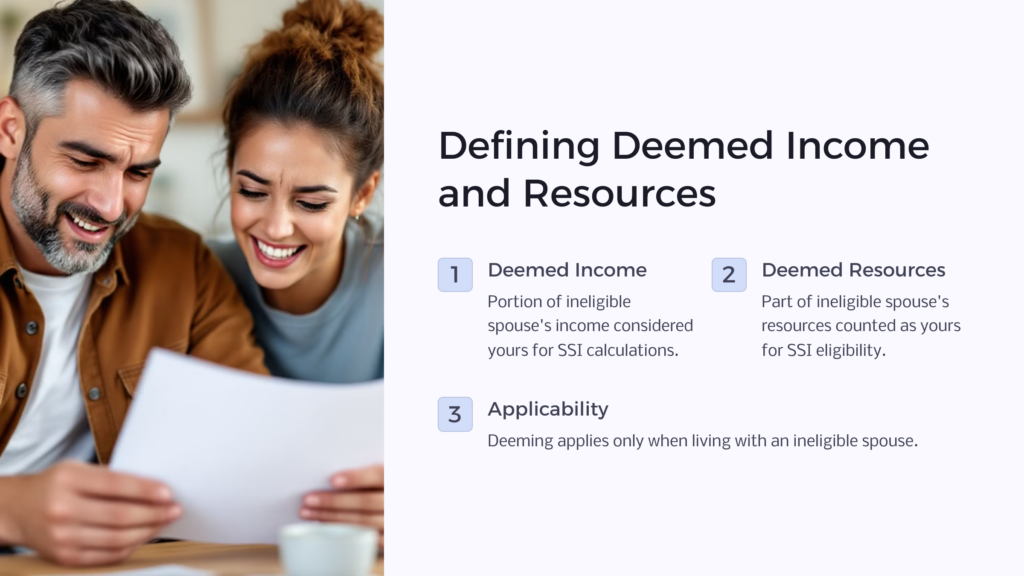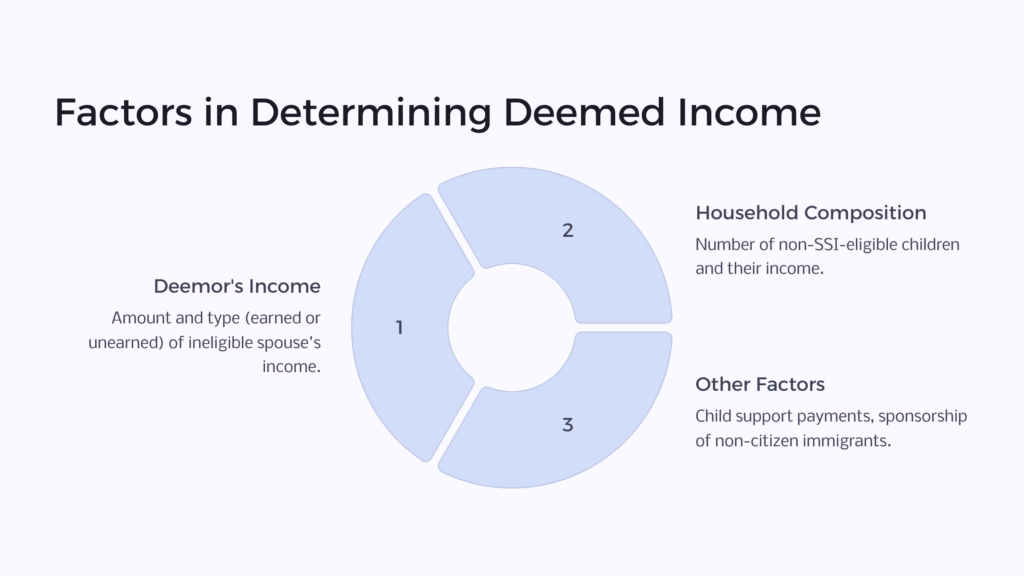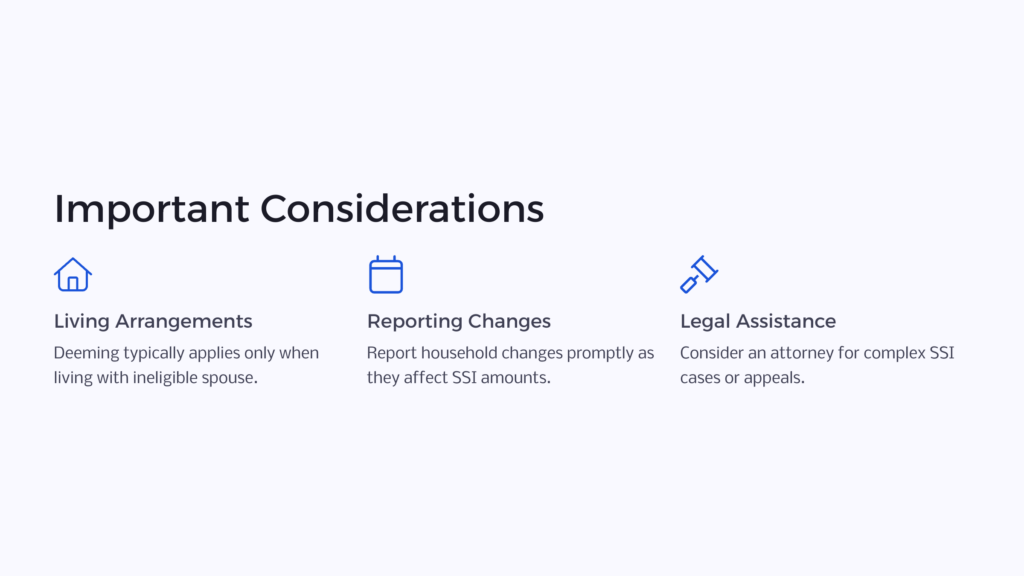The Definition of Deemed Income and Deemed Resources

Qualifying for SSI disability medically is one step in getting benefits. However, because SSI is a needs-based public assistance program, you must first meet the financial qualifications. Deemed resources and deemed income refer to the portion of your SSI-ineligible spouse’s income and resources that are considered to be yours and that are used in calculating your SSI payment and in determining whether you meet the SSI resource limit. This deeming applies only if your spouse is living with you.
Determining the Amount of Deemed Assets
If an SSI applicant or recipient is married and living with his or her spouse, the spouse’s countable assets are added to the SSI applicant’s countable assets. Then the total is compared to the SSI resource limit for couples, which in 2020 is $3,000.
Keep in mind that many assets are not considered resources for SSI. For example, a home that you live in, usually one vehicle used for family transportation, some burial funds and policies, pension funds, and several other kinds of assets are not deemable assets and do not count towards the resource limit.
Factors in Determining the Amount of Deemed Income

The amount of income that is deemed to an SSI applicant from his or her ineligible spouse depends on the amount of income the “deemor” has, whether the income is earned or unearned, on the number of non-SSI-eligible children in the household, on whether or not those children have income of their own, on whether or not the ineligible spouse is paying child support for a child outside the household, and on whether the ineligible spouse is sponsoring a non-citizen’s immigration to the U.S.
Deeming Income from Spouse to Spouse
Several steps are involved in calculating the amount of the spouse’s income, if any, that is deemed available to the SSI applicant.
First, if there are minor children in the household who are not eligible for SSI and who do not receive public income-maintenance payments, then an amount equal to the difference between the unreduced federal SSI rate for a couple and the unreduced federal rate for an individual is allocated and excluded for the child’s support. An allocation is also deducted for any alien that the ineligible spouse has sponsored. In 2020 the difference between the $1,175 couple SSI rate and the $783 individual rate is $391. The amount potentially allocated for each child or sponsored alien is reduced by the amount of most types of income the child or sponsored alien may have.
After these allocations are determined, they are used to reduce the ineligible spouse’s income, starting with any unearned income. If the spouse does not have enough unearned income of offset the allocations, the allocations will be applied to the spouse’s earned income, if any.
Example calculation:
Let’s say that an ineligible spouse has a $100 unearned income and $1,400 a month gross wages and the family has two ineligible children, one of whom receives child support in the amount of $200 a month. The eligible spouse has $150 private pension and $120 in wages.
Here’s how the Social Security Administration would figure out the amount of income to be deemed.
Children’s Allocation Calculation
$392.00 allocation for first child
– 200.00 child support
$ 192.00 net allocation for first child
+392.00 allocation for second child
$584.00 total children’s allocation
Calculation of Ineligible Spouse’s Income after Children’s Allocations
$ 100.00 spouse’s unearned income
– 100.00 portion of children’s allocation
0 spouse’s remaining unearned income
$1,400.00 spouse’s earned income
– 484.00 remaining children’s allocation
$ 916.00spouse’s remaining earned income
The next step is to compare the ineligible spouse’s remaining income to the difference between the federal SSI couple rate and the individual rate, which, as noted, in 2020 is $392. 00. If the remaining amount is less than the difference, deeming does not apply and the SSI applicant’s benefit is calculated based on his or her income alone.
In our example, the ineligible spouse’s remaining countable income of $916.00 is more than $392.00, so the calculation moves to the next step, which is to treat the SSI applicant and the ineligible spouse as an eligible couple for the purposes of determining eligibility and potential payment amount. This is done by combining the remainder of the ineligible spouse’s income after allocation for children with the SSI applicant’s income.
Unearned income calculation
$ 150.00 eligible spouse
+ 0 ineligible spouse’s remaining unearned
$ 150.00
– 20.00 general income exclusion
$ 130.00 total countable unearned income
Earned income calculation
$916.00 ineligible spouse’s countable earned income
+ 120.00 eligible spouse’s earned income
$ 1,036.00 couple’s earned income
– 65.00 earned income exclusion
$ 971.00
/ 2 second earned income exclusion
$ 475.50 total countable earned income
Payment calculation
$1,175.00 SSI couple maximum rate
– 475.50 countable earned income
$ 699.50
*The actual amount payable to the eligible person cannot exceed the amount that the eligible person would have received with no deeming involved.
Important Considerations

It’s very important to report changes in household composition, admission to institutions, marriages, divorces, and births because all these may affect deemed income and the amount of SSI due.
It is worth mentioning again that many kinds of income are not counted in determining SSI eligibility. Generally deeming does not apply if the spouse does not live with the SSI-eligible person. Exceptions include temporary absence, such as an ineligible spouse being absent due to a duty assignment as an active member of the armed forces or temporarily hospitalized.
Deeming does not apply if the SSI recipient becomes a resident of an institution and becomes eligible for the $30 SSI benefit rate.
Deemed income follows the general rule regarding when income counts, that is, two months following when it is received except when eligibility is just starting or re-starting after a month of ineligibility, after some changes in marital status or household composition, and a change in living arrangements such as coming out of an institution.
The explanations in this article cover the most common and simplest situations. The laws that govern SSI financial eligibility including deeming are very complex. If your income caused a denial when you were qualifying for SSI Disability or you believe that too much of your spouse’s income or assets were counted against your SSI benefit, an attorney well-versed in SSI and Social Security law can be very helpful when you file an SSI appeal.
SSI Benefits For A Family Member With Mental Issues
Learn how an adult with mental issues may own a home and still qualify for Supplement Security Income (SSI) benefits to help pay monthly expenses.
Dear Benefits Advisor,
My 56 year old brother in law has not worked since he has been 22 years old. When he was 18 his parents had him committed with schizophrenia briefly for a week or so, he begged them to come home and they let him. He never went for treatment, went off his meds and the rest of the children left the home, got married and got on with life, He continued to live at his parents house and they never forced him to get help, a job or see a doctor…fast forward 34 years and his parents are in assisted living in their mid eighties and now it is falling on us to help him. The other two siblings washed their hands of it. He still has his mental issues and thinks his nose is messed up and has had over 100k of surgery lol…and his nose is beautiful. The issue is he would definitely qualify for SS if we could get him to admit he has a problem and also see a Dr. but he is living on the streets, has over $100 k in bank and 15k of gold strapped to him in gold coins. He’s paranoid of the government or authority figures, he feels that life has been unfair to him because his nose and it has disfigured his face (which of course is not true.) We would like to help him maybe buy a little land and maybe a mobile home cash but how will he pay his monthly expenses?? So what are our options in regards to getting SS for someone who would def meet all the requirements of disability (mentally) but will not admit he needs the help? Desperate in Arizona, Audrey
Dear Audrey,
I am sorry that you are dealing with such a difficult issue: that of trying to help an uncooperative family member suffering from mental illness. Not only is this a complex problem but it also takes an emotional toll on everyone, including people like you who are desperate to find a solution.
First, let me explain that your brother-in-law likely cannot qualify for Social Security Disability (SSDI) benefits because you would have to prove that he became disabled while he was still insured for SSDI, if he ever was. Becoming disabled at age 26 would require him to have had 10 quarters of coverage at that time. If he was insured, he would have to submit medical records from age 26 to present to show that he was disabled when he stopped work and continued to be disabled continuously to present. It could be impossible to obtain records so old.
Another type of disability benefit he might qualify for is Supplemental Security Income (SSI), which you could help him obtain with some specific action. SSI is based on evaluations of financial assets and health. Generally, a person cannot have countable assets of more than $2,000. (A home he is living in, a car, and a few other specific assets don’t count). So you could help him purchase a land and mobile home with his money and even pay in advance a year’s insurance and taxes to reduce his countable assets to $2,000. The next step is to get him to go for a psychological consultation to evaluate his medical condition. This does not mean he has to go for or be in treatment but a written evaluation is another part of the submission process. If you are able to persuade him to cooperate with both these actions, you will have the information to complete a request for SSI benefits. These benefits may be enough for him to live on his own more comfortably.
However, your greatest obstacle is getting him to understand and agree to this plan of action that may yield a better future for him, at least from your perspective. For your own peace of mind, you might look for mental health resources in your community to discuss the situation with professionals who are familiar with problems like yours. An excellent start is at Mental Health America of Arizona (www.mhaarizona.org) where you can get information, learn more about the specifics of mental health disability, and find counselors and other resources to help you.
I applaud your patience in tackling this issue with your brother-in-law and hope this information is helpful in finding a good resolution.
Sincerely,
Benefits Advisor
 Benefits.com Advisors
Benefits.com Advisors
With expertise spanning local, state, and federal benefit programs, our team is dedicated to guiding individuals towards the perfect program tailored to their unique circumstances.
Rise to the top with Peak Benefits!
Join our Peak Benefits Newsletter for the latest news, resources, and offers on all things government benefits.




















